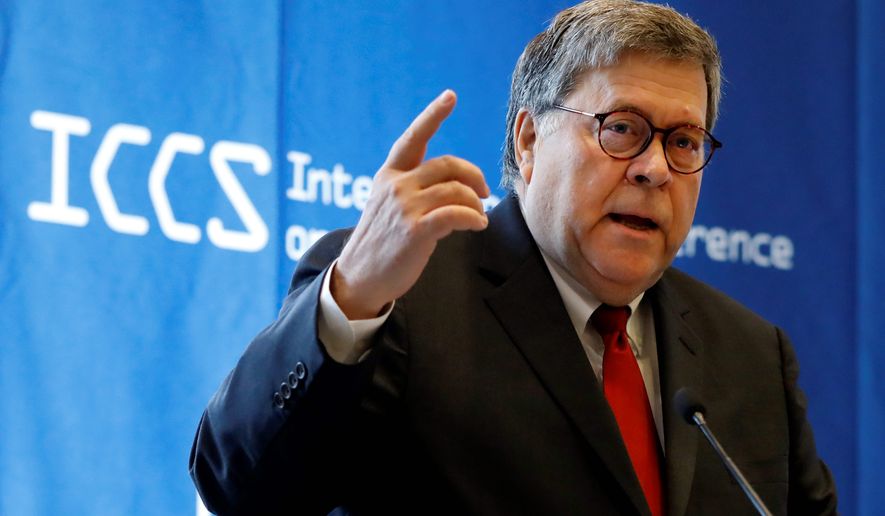Attorney General William P. Barr said Tuesday the nation’s leading technology companies must assist law enforcement officials investigating terrorists, drug cartels and other criminal suspects using encrypted messaging apps.
Delivering the keynote address at the International Conference on Cyber Security in New York City, Mr. Barr said encrypted and secure “consumer products and services” offered by Apple, Facebook and other tech firms threaten national security. The products include messaging, smartphones, email, and voice and data apps that prevent unauthorized scrutiny of their content.
“By enabling dangerous criminals to cloak their communications and activities behind an essentially impenetrable digital shield, the deployment of warrant-proof encryption is already imposing huge costs on society,” the attorney general said.
Cryptographers and cybersecurity experts were quick to push back, countering that even limited access to secure platforms could quickly unravel into access for all manner of hackers and online criminals, thus rendering encryption useless.
Georgetown University cryptography professor Matt Blaze acknowledged that law enforcement has “real, important problems,” but he denounced as naive Mr. Barr’s and the Department of Justice’s view of encryption.
“A magic decryption wand would surely help them [law enforcement] if one could exist,” Mr. Blaze tweeted. “But so would time travel, teleportation, and invisibility cloaks. Let’s stick to the reality-based world.”
In Washington, Sen. Ron Wyden called Mr. Barr’s remarks “outrageous, wrongheaded and dangerous,” and echoed growing concerns over the federal government’s ability to surveil and monitor communications of everyday Americans.
“If we give this attorney general and this president the unprecedented power to break encryption across the board and burrow into the most intimate details of every American’s life, they will abuse those powers,” the Oregon Democrat said.
Encrypted messaging programs, offered by Instagram, WhatsApp and others, gained popularity after Edward Snowden leaked National Security Agency documents on the government’s ability to monitor email and cellphone communications in 2013.
Law enforcement officials have argued that encryption thwarts their ability to prosecute criminals. Most notably, the FBI in 2015 pushed for access to the encrypted devices and communications of one of the killers in a terrorist attack that killed 14 people in San Bernardino, California.
At the time, the Justice Department took Apple to court, arguing that the tech giant needed to unlock the terrorist’s iPhone. The FBI ultimately found a way to hack into the device.
Facebook, which is preparing to provide more encryption services, recently reiterated that allowing government officials “backdoor access” would jeopardize cybersecurity for millions of law-abiding citizens.
On Tuesday, Mr. Barr kept his focus on crime, warning that terrorists and cartels were exploiting the technology to plan operations, such as the coordination of murders of Mexico-based police officials.
Cybersecurity experts noted that he offered no prescriptive policy solutions and only pressured the private sector to fix a problem he said it had created.
“The status quo is exceptionally dangerous, it is unacceptable and only getting worse,” Mr. Barr said. “It’s time for the United States to stop debating whether to address it and start talking about how to address it.”
• Dan Boylan can be reached at dboylan@washingtontimes.com.




Please read our comment policy before commenting.